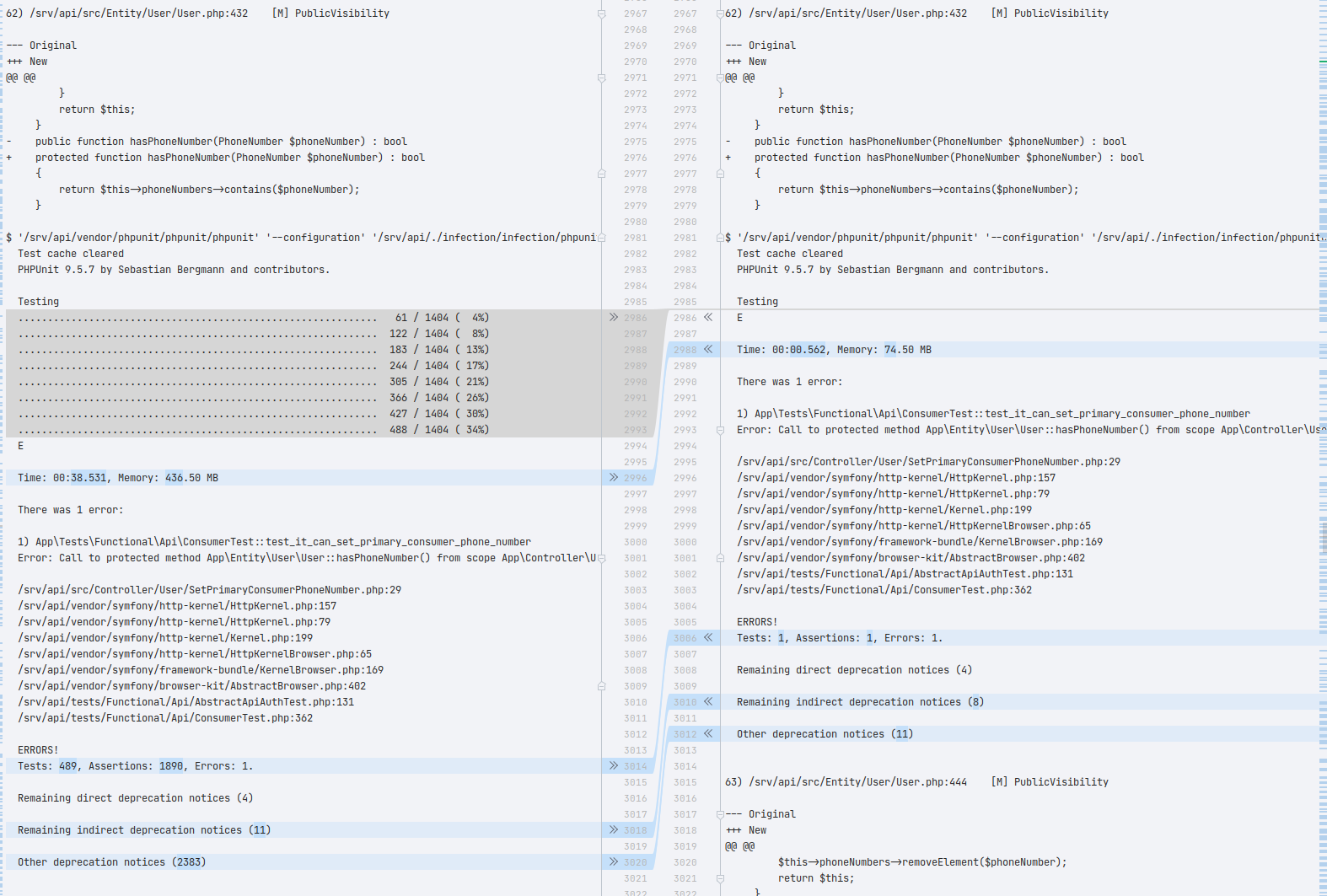- Guide
- Playground
- GitHub
-
Ecosystem
Help
Resource Lists
Recent Posts

- What's new in Infection 0.26.0
- What's new in Infection 0.25.0
- What's new in Infection 0.24.0
- What's new in Infection 0.23.0
- What's new in Infection 0.21.0
- What's new in Infection 0.20.0
- What's new in Infection 0.19.0
- What's new in Infection 0.18.0
- What's new in Infection 0.17.0
- What's new in Infection 0.16.0
What's new in Infection 0.25.0
Sep 6, 2021
Release: https://github.com/infection/infection/releases/tag/0.25.0
Speed up Infection runs by remembering which test killed a mutant
When Infection runs Mutation Analysis for the first time, we can save the information about which Mutant was killed by which test, and then on the subsequent Infection executions (second and farther), we can use this cached knowledge and run those tests that killed particular Mutants first.
This will benefit all Infection users, especially those who use Infection with slow functional tests where the difference between running 1 or 2 tests can be in seconds.
Here is an example for the real project, showing the difference between the very first and the second Infection runs for one particular Mutant:
You can notice that on the first Infection run, we had to run 489 tests in order to kill PublicVisibility Mutant and it took 38 seconds (!), because functional tests are quite slow.
On the same time, on the second Infection run, we got the previously saved information and executed failed test first (that test that was 489th on the first run), and we killed Mutant by 0.5s.
Running this new feature for one branch on the real project with slow functional test, we got the following result:
- Time: 1m 49s. Memory: 0.07GB (first run) |
Generate coverage for filtered files only when --filter or --git-diff-filter are used
Collecting coverage data is very expensive operation.
In previous versions, when Infection ran your test suite, it did it with --coverage-xml and --log-junit report, because Infection needs this data to know by whats tests particular line of the source code is covered, and how fast the tests are.
Imagine, you have 1000 tests that takes 1m to be executed. When you run them with coverage, 1m can become 2, 3 or even more minutes, because collecting code coverage data costs a lot.
More and more people start using Infection for changed files only (this can greatly decrease the time needed for Mutation Analysis), and collecting coverage data for all the files is useless when you are mutating only 2 files from thousands.
When the --filter option is used in Infection, we 100% know that we will mutate only particular files, so we need the code coverage only for them.
Starting from 0.25.0, the next command line
infection --filter=src/path/to/File1.php,src/path/to/File2.php |
creates the following phpunit.xml for initial tests under the hood:
<phpunit> |
This will dramatically decrease the time needed for collecting coverage data since we reduce the number of processed files.
We recommend using
pcovto collect coverage, notXdebugorphpdbg
Some numbers
Tests with the wholesrc folder in coverage.include:
............................................ 2423 / 2423 (100%) |
Tests with 5 files in coverage.include:
............................................ 2423 / 2423 (100%) |
Difference:
- Time: 03:11.112, Memory: 587.62 MB |
So, it saves 2 from 3 minutes.
Another case is with Infection and --filter option used for the real project.
infection -j4 --only-covered --filter=src/Recorder/RecorderCapabilities.php --ignore-msi-with-no-mutations --show-mutations --log-verbosity=all --only-covering-test-cases |
it is 4x faster for the filtered file set.
Notes: this feature will benefit those developers, who use Infection with --filter or --git-diff-filter options, running MT for the changed/added files.
JSON schema inside infection.json
Infection will now add $schema property to generated infection.json file. This will allow IDEs to autocomplete all the settings available for usage.
If you already use Infection, please do the following:
- Rename
infection.json.disttoinfection.jsonif applicable Add
$schemato yourinfection.jsonfile:
if you installed Infection viaComposer:{
"$schema": "vendor/infection/infection/resources/schema.json"
}or if you downloaded PHAR distribution:
{
"$schema": "https://raw.githubusercontent.com/infection/infection/0.25.0/resources/schema.json"
}
Detect syntax errors during mutation analysis
Infection will now detect syntax errors produced by Mutation Operators. Chances that it will happen with built-in mutators are quite low, because we are linting the mutated source code in Infection tests.
But since in the future we will allow users to add their own mutators, it’s better to track syntax errors and do not treat such cases as Killed Mutants.
Example of the logs generated for syntax error:
Syntax Errors mutants: |
Among these new features, there were several bug fixes and internal improvement so please upgrade.
Enjoying Infection? Consider supporting us on GitHub Sponsors ♥️

